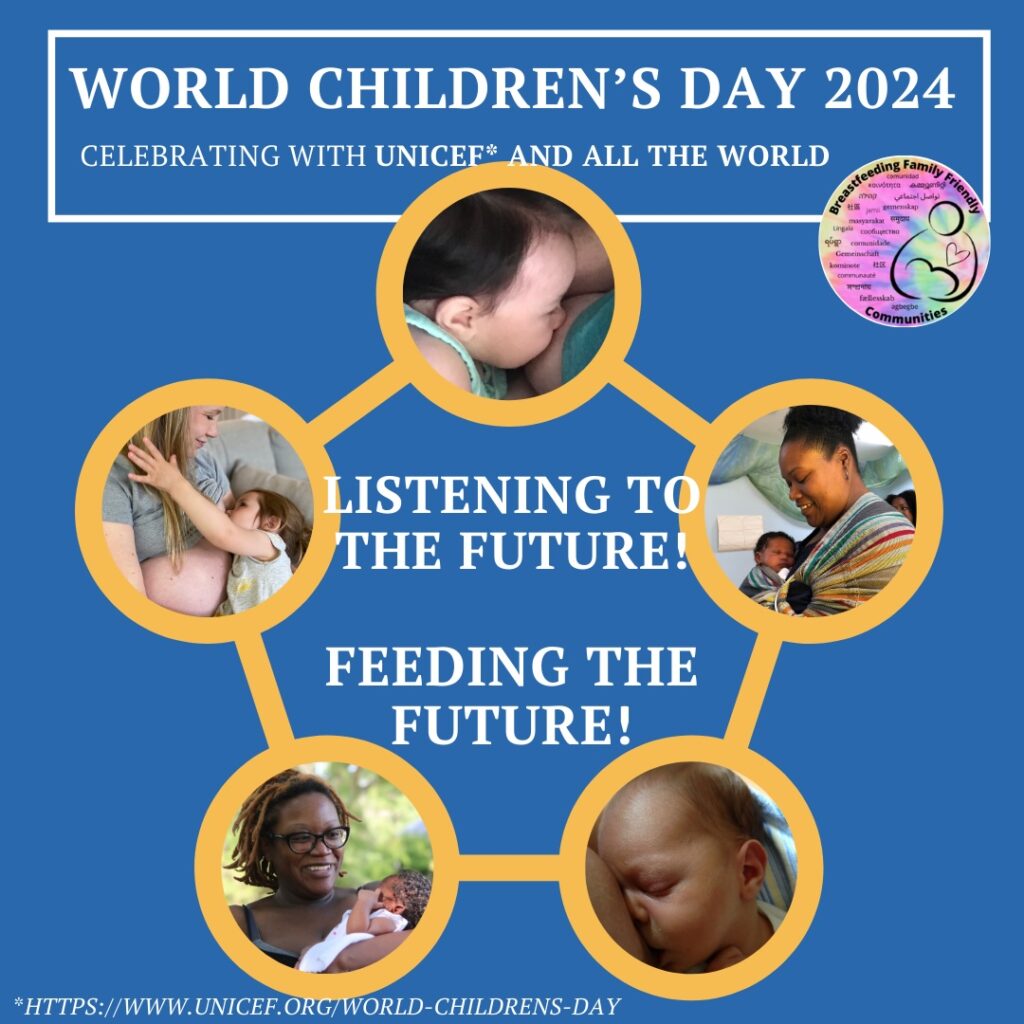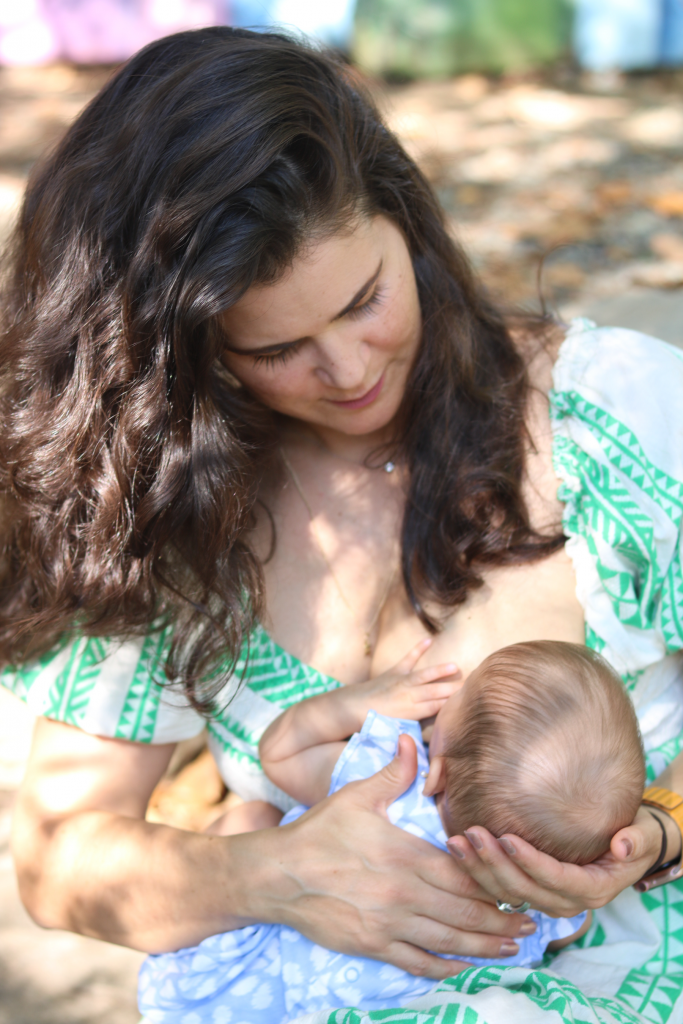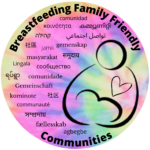
Wednesday, November 20th, 2024, was World Children’s Day.
Breastfeeding Communities joined in celebration with UNICEF and communities all across the world to:
Listen to the Future
Even the very youngest members of our communities can express their needs for the future, and Breastfeeding Communities works to meet those needs.
We all know that children are the future, and we want to ensure that every child has the best start to survive and thrive and grow to their full potential! The UNICEF Convention on the RIghts of the Child provides the framework for meeting these needs, and Article 24(e) speaks directly to our work in lactation.
…To ensure that all segments of society, in particular parents and children, are informed, have access to education and are supported in the use of basic knowledge of child health and nutrition, the advantages of breastfeeding, hygiene and environmental sanitation and the prevention of accidents…
Convention on the RIghts of the Child
Breastfeeding Family Friendly Communities is all about children and families, working to create a world in which families can safely breastfeed, chestfeed, and human milk feed their children. The Breastfeeding Family Friendly Communities Ten Steps touch on all the places and spaces that families work, learn, dine, shop, play, grow, heal, worship, gather…all the places in our communities that you will find children and their families.
We advocate for family friendly lactation policies and practices in our governments and the healthcare, childcare, and educational systems. We offer resources and assistance to employers to develop policies that create welcoming workplaces for their lactating employees.
Importantly, we celebrate the work of our local governments, healthcare, businesses, organizations, schools, and all in the community to provide a safe, welcoming environment that supports lactating families. A breastfeeding family friendly community supports the health and well-being of children, their families, and the entire community.
Why focus on breastfeeding?
Breastfeeding is no small matter. Human milk packs a big punch in child nutrition and development. Not only is the milk rich in nutrients to meet the incredible growth of children in the early months and years, it also is rich in antibacterial and immunological components to help keep children safe, healthy, and growing well. These components are essential for everyday growth and development, and they are critical when there is a crisis!
There is another, equally crucial, component to consider! Nursing a child, nurturing the child from the breast or chest, provides a source of emotional well-being for the child, a feeling of safety and comfort. And, bonus, the hormones that are released while breastfeeding also foster the well-being of the parent!
What about breastfeeding during emergencies?

Relief workers may sometimes believe that infant formula is “better” than breastfeeding in emergencies, and the large volume of infant formula that companies and individuals donate during emergencies seems to support this belief. However, the Centers for Disease Control and Prevention (CDC) Infant and Young Child Feeding in Emergencies toolkit provides important information on how donations of infant formula can result in harmful outcomes, and the recent crisis in Western North Carolina in the U.S. shines a powerful spotlight on the importance of breastfeeding for the health and safety of children.
When clean, safe water and reliable power are not available, it is difficult and often impossible to ensure safe infant feeding in emergencies for our youngest community members, when they are not breastfed. Single serving ready-to-feed (RtF) formula has been offered as a safe alternative, and it is essential when babies are being formula fed. Each packet is a self-contained source of infant formula that can be fed through a clean, disposable paper cup, which is important when clean nipples and rings are unavailable. The challenge is keeping enough RtF formula available in a temperature-controlled setting for families to maintain adequate feeding over days or weeks or months, in the case of Western North Carolina, or years in many parts of the world! It is not the long-term solution. It is not the safest solution.
When children are breastfeeding, there is no need to give the formula to the family, even in emergencies! Providing formula “just in case” sets up uncertainty for the parents; they wonder if they are doing the right thing by breastfeeding. Breastfeeding is the safest, healthiest option, especially in emergencies. While the RtF formula is safer than mixing powder or concentrated formula with contaminated water when a family already is formula feeding, it does not provide the protection and optimal nutrition that babies receive from human milk. RtF formula, which requires clean bottles or cups (hopefully disposable), is not as safe as feeding directly from the breast. Breastfeeding requires no supplies, and it is always available when the child needs it.
Successful breastfeeding can continue during emergencies. In fact, breastfeeding should be supported and encouraged during emergencies to provide protection from infections and disease for the baby and to reduce stress for the parent. Parents may need support and encouragement to continue nursing, and relief workers need to ensure that parents and babies remain together to be able to nurse frequently; however, parents who are breastfeeding do not need to receive formula! Parents can continue to produce breast milk during stressful times.
Timely practical and emotional support can reduce stress related to infant feeding concerns. Because of the release of certain hormones, breastfeeding may even reduce stress for the mother and baby during challenging situations.
U.S. Centers for Disease Control and Prevention
Listening to the Future. Feeding the Future.
So, the 2024 World Children’s Day has passed. Now what? Families are under increasing stress worldwide from natural disasters, climate change, and political conflicts. Children are carrying the burden of these events. Their voices may be drowned out by the noise of devastation and conflict. Children’s Day is not a “day.” Rather it is a reminder about our commitment to listening to our children and to meeting their needs. Breastfeeding Family Friendly Communities is dedicated to building welcoming, safe communities for children and their families to survive, thrive, and grow everyday!
